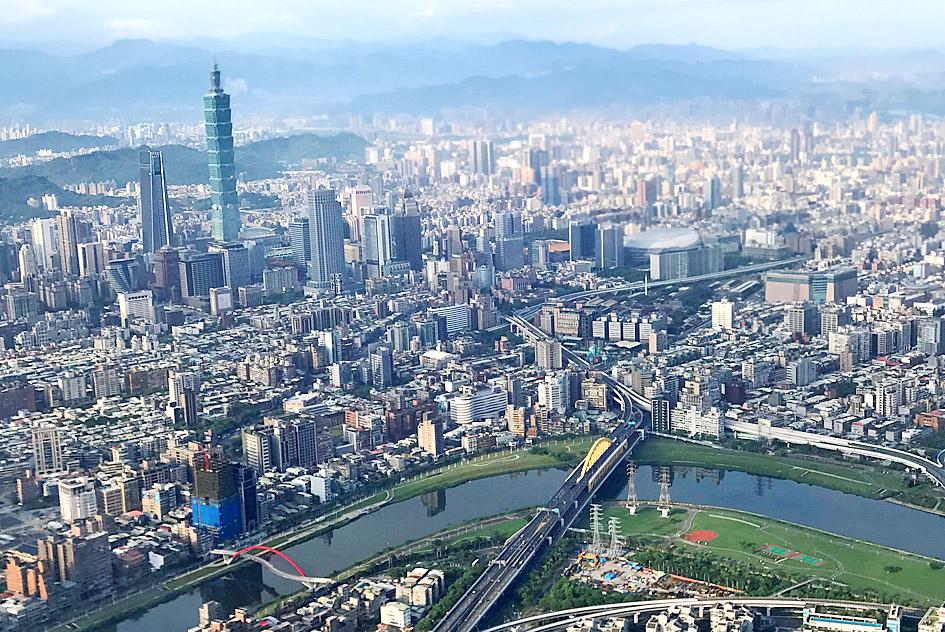The population of Taipei last year fell to the lowest in 23 years due to high rent, more transportation options and the expansion of northern cities into a single metropolis, academics and city officials said on Monday.
Data released this month by the Ministry of the Interior showed that the capital was home to 2,602,418 people last year, down 42,623 from 2019.
The decline is second only to 1993, when the population fell by 42,828 people, while Taipei’s population was the lowest it has been since 1997.

Photo: Tyrone Siu, Reuters
Taipei saw the biggest drop among the six special municipalities, while Taoyuan led the group in population increase, adding 19,770 people.
The figures are not unusual, as Taiwan’s population is declining, said Chen Liang-chuan (陳亮全), a former professor in the Department of Urban Planning and Disaster Management at Ming Chuan University in Taipei.
As rent and early education costs in Taipei are the nation’s highest, “it is difficult for young people to start families here,” he said.
Taipei Department of Civil Affairs statistics show that the difference between the number of births in 2019 and last year was less than 2,500, but more than 34,000 people moved away, which shows that the population decline was due to societal, not natural factors.
Wu Chung-hsing (吳重信), head of population policy at the civil affairs department, said that the exodus is to be expected.
Given the population density in Taipei, public transportation expansion and flexible real-estate options, it is natural that people would move to New Taipei City, Taoyuan or other places where housing is cheaper, Wu said.
In a 2019 survey, the civil affairs department found that most former Taipei residents moved to New Taipei City’s Tamsui (淡水) or Sanchong (三重) districts, he said.
Rezoned areas near Banciao, Jiangzicui, Xinzhuang Fuduxin and other stations on the MRT lines linking Taipei, New Taipei City and Taoyuan are also popular, he said.
However, the population movement would gradually stabilize as the nation’s northern cities combine into a single metropolis, Wu said.
What was previously the “Taipei-Keelung” area has already expanded to include New Taipei City, he said, adding that Taoyuan would likely be absorbed next.
Chung Hua University professor Tu Tze-chen (杜紫宸) said that population shift away from Taipei was likely due to housing and transportation costs.
In New Taipei City’s Tucheng (土城) and Sindian (新店) districts alone, homes are NT$150,000 to NT$200,000 cheaper per ping (3.31m2) than in Taipei, Tu said.
New Taipei City and Taoyuan are the most attractive options for Taipei residents seeking to move, as land is limited in Keelung, while Yilan County is not favored, as traffic on the Chiang Wei-shui Memorial Freeway (Freeway No. 5) is often congested, he said.

CAUTION: Based on intelligence from the nation’s security agencies, MOFA has cautioned Taiwanese travelers about heightened safety risks in China-friendly countries The Ministry of Foreign Affairs (MOFA) yesterday urged Taiwanese to be aware of their safety when traveling abroad, especially in countries that are friendly to China. China in June last year issued 22 guidelines that allow its courts to try in absentia and sentence to death so-called “diehard” Taiwanese independence activists, even though Chinese courts have no jurisdiction in Taiwan. Late last month, a senior Chinese official gave closed-door instructions to state security units to implement the guidelines in countries friendly to China, a government memo and a senior Taiwan security official said, based on information gathered by Taiwan’s intelligence agency. The

The National Immigration Agency (NIA) said yesterday that it will revoke the dependent-based residence permit of a Chinese social media influencer who reportedly “openly advocated for [China’s] unification through military force” with Taiwan. The Chinese national, identified by her surname Liu (劉), will have her residence permit revoked in accordance with Article 14 of the “Measures for the permission of family- based residence, long-term residence and settlement of people from the Mainland Area in the Taiwan Area,” the NIA said in a news release. The agency explained it received reports that Liu made “unifying Taiwan through military force” statements on her online

Taiwan Semiconductor Manufacturing Co (TSMC), the world’s largest contract chipmaker, said yesterday that it is looking to hire 8,000 people this year, at a time when the tech giant is expanding production capacity to maintain its lead over competitors. To attract talent, TSMC would launch a large-scale recruitment campaign on campuses across Taiwan, where a newly recruited engineer with a master’s degree could expect to receive an average salary of NT$2.2 million (US$60,912), which is much higher than the 2023 national average of NT$709,000 for those in the same category, according to government statistics. TSMC, which accounted for more than 60 percent

Tung Tzu-hsien (童子賢), a Taiwanese businessman and deputy convener of the nation’s National Climate Change Committee, said yesterday that “electrical power is national power” and nuclear energy is “very important to Taiwan.” Tung made the remarks, suggesting that his views do not align with the country’s current official policy of phasing out nuclear energy, at a forum organized by the Taiwan People’s Party titled “Challenges and Prospects of Taiwan’s AI Industry and Energy Policy.” “Taiwan is currently pursuing industries with high added- value and is developing vigorously, and this all requires electricity,” said the chairman